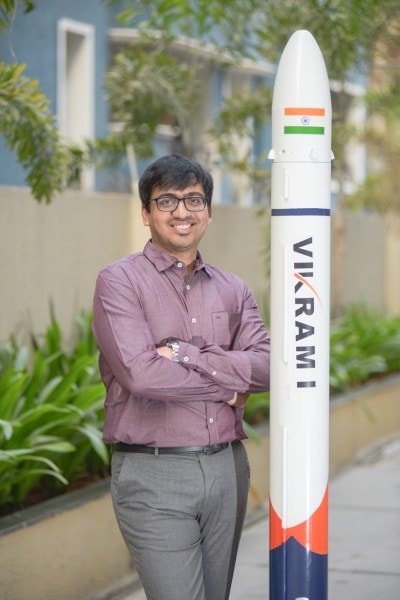‘Chandrayaan’s success will inspire private space industry to push our own boundaries of innovation’
The Indian Express interviewed three prominent entrepreneurs in space technologies to understand what Chandrayaan-3 means for their own future, and how do they intend to contribute to ISRO’s space programme in the future.
 Srinath Ravichandran of Agnikul Cosmos, Pawan Kumar Chandana of Skyroot, and Prateep Basu of Satsure, three prominent entrepreneurs in space technologies, share what Chandrayaan-3 means for their own future. (Express photo)
Srinath Ravichandran of Agnikul Cosmos, Pawan Kumar Chandana of Skyroot, and Prateep Basu of Satsure, three prominent entrepreneurs in space technologies, share what Chandrayaan-3 means for their own future. (Express photo) While Chandrayaan-3 mission has got the entire country excited, for a fast-emerging entrepreneur class in the private space industry in India, the mission’s success is closely tied to their growth and success too. The Indian Express interviewed three prominent entrepreneurs in space technologies – Srinath Ravichandran of Agnikul Cosmos, Prateep Basu of Satsure, and Pawan Kumar Chandana of Skyroot – to understand what Chandrayaan-3 means for their own future, and how do they intend to contribute to ISRO’s space programme in the future.
Srinath Ravichandran is the co-founder of Agnikul Cosmos, which makes launch vehicles and launch systems. Agnikul is preparing to launch its first rocket, Agnibaan, from its own launchpad at the ISRO launch facility in Sriharikota. Srinath is an electrical and aerospace engineer, and was a Wall Street trader before he started Agnikul in 2016.
Pawan Kumar Chandana is co-founder of Skyroot, which makes rockets for launching small satellites to Low-Earth orbits. Last year, Skyroot tested its first rocket, Vikram-S. It was the first private rocket launch in India. Chandana, an alumnus of IIT Kharagpur, worked with ISRO before starting his own company.
Prateep Basu is CEO of Satsure, which aims to offer satellite-based space data and solutions for specific applications in agriculture, infrastructure, climate change and financial inclusion sectors. Basu is a product of Indian Institute of Space Science and Technology and has worked with ISRO for about three years.
How important is the Moon landing event for India? How are space entrepreneurs like you and your companies likely to benefit from this?
Srinath Ravichandran (Agnikul Cosmos): I think it helps us, the private industry, in many different ways. First, it is a way to build more credibility for our space programme. That means investors, vendors, customers, everyone in the outside world begins to take Indian space technology more seriously. Agnikul (his firm) is not ISRO. But if ISRO does something amazing and if other people know that ISRO and Agnikul work together, that credibility rubs off on us.
Second, it might look a bit futuristic today but there are areas of space exploration which today do not have business models and only a government agency can attempt those. Supposing Agnikul wants to go to the Moon — hopefully we would be there some day — but if we want to do it today, what are we going to tell our investors? Why are we going there? Who will fund the journey? That burden, that responsibility or the challenge is best taken up today by government agencies. Once this gets established, once the know-how exists in the country, as far-fetched this may sound, there will be business models that would come out of this, and at that point, we would already be well-positioned to take advantage. Building a business model is something that the private industry is more equipped with. But it can’t first build a business model and then start figuring out how to go to the Moon. That first step will have to be taken by the national agency. That’s what ISRO is doing.
The third reason is slightly intangible — this inspirational thing. From a broader perspective, the number of aeronautical engineers or other kinds of talents who would stay back in the country, the number of people who would come back to India to work with space start-ups, would be huge. The human capital credibility just goes up several notches. People would want to work from India, and with India, because they know India has such technologies. I have seen that happen already. When I came back from the US in 2017, it was still a little less common to do so, but ever since my own return, I have seen lots of people coming back. It is not so bad for people in aerospace to get back to India. I hope these kinds of accomplishments by ISRO will actually push people more to work in India.
Also, with ISRO, you know, once they perfect the technology, they allow vendors to start working on the systems. It might still seem far-fetched today, but at some point Chandrayaan would be privatised. At that time, lots of industries will get businesses. We are building an ecosystem here. And we are taking the first steps in getting there. That is very positive for all of us.
Prateep Basu (Satsure): This is a momentous occasion for India and its space programme. Young private companies like us function mainly in the lower Earth orbits, where satellites are placed. Beyond these orbits is the realm of space exploration, where only the national space agencies, or private missions funded by governments, participate. Private companies like us are developing new technologies for launch vehicles as well for satellites. This is because technology in these sectors is already proven and mature, thanks to the decades of work done by national space agencies. The orbits are now open for players like us for business or exploration. That is why you see a plethora of private satellites across all classes of orbits.
Missions like Chandrayaan-3 do to space exploration what their earlier missions did to the lower Earth orbits. Eventually, the technologies would become mature, accessible and affordable for other players as well. As the capabilities of ISRO grow, and space exploration becomes common, the Indian space industry would also like to step in and contribute. It will inspire us to push our own boundaries of innovation. Moon landing is just the beginning. ISRO has many more missions planned, including one to the Sun and Venus. It will lead to many benchmarks being set. Who knows, in India too, we will soon see private players become active participants in space exploration missions in the not-too-distant future.
 Pawan Kumar Chandana of Skyroot says that Chandrayaan-3’s success could attract more global aerospace customers. (Express photo)
Pawan Kumar Chandana of Skyroot says that Chandrayaan-3’s success could attract more global aerospace customers. (Express photo)Pawan Kumar Chandana (Skyroot): The success of Chandrayaan-3 will be a major milestone for India. The ability to harness resources from the Moon would be a gamechanger for humanity, considering it is almost 20 times more efficient to tap resources from the Moon than Earth for building a thriving Low Earth Orbit (LEO) economy. Building capabilities to reliably access the Moon and exploring it are the key.
The success of this mission serves as a technology demonstrator for future Moon missions, and a strong boost for private space entrepreneurs in India. The cost-efficient and highly reliable space-grade hardware that the Indian space industry ecosystem has supplied to this mission would advance investor confidence in India’s space industry and also increase revenue flow into the industry. This landmark achievement could attract more global aerospace customers, joint ventures into India, and elevate Indian space-tech companies to a position where they can design and manufacture space systems and subsystems, and become suppliers to lunar programs by other countries.
How big a disappointment was the Chandrayaan-2? Where were you then?
Srinath Ravichandran (Agnikul Cosmos): That was heartbreaking. It was after midnight. We were watching it. We were working out of an R&D centre at IIT Madras at that time. The entire team was there. If you remember, the update on the screen just froze. For a couple of minutes, we didn’t know what happened… But very quickly we realised there was a problem. We didn’t know about the crash, but it was evident there was a problem.
You sort of empathise very deeply with a feeling like that when you are building hardware because you know how many things can go wrong. There are extremely complex sets of things that are supposed to happen completely remotely. It is like 25 things have to happen together, and you have absolutely no say over it. It is very scary. It was definitely heart-breaking. But these are also the things that keep you going as a start-up. Space is hard, and we all have to stay humble.
Pawan Kumar Chandana (Skyroot): We were a fledgling space-tech company which was just into its second year of operations when Chandrayaan-2 landing failed. We recall feeling quite disheartened by the result, especially since we hail from ISRO and have deep emotional bonding with our first place of work. We could imagine the Herculean efforts that would have gone into planning and implementing the mission, which made success so deserving. However, we understand that space is tough and it was a phenomenal achievement reaching that close to landing.
Going forward, how do you see space entrepreneurs like yourself contributing to India’s future space exploration missions?
Srinath Ravichandran (Agnikul Cosmos): I think there is a lot to be done. The ISRO model has been that the core R&D and development happens within ISRO, and the execution, after a few tests, happens outside. But with so much encouragement being now given to private industry, I think there is going to be some independent technology development outside. Private industry takes the know-how help of a lot of retired ISRO scientists. The good thing about being a space-faring nation is that there is know-how available. It’s not like we don’t know what to do or how to do it.
I think right now it is a little early for private space companies in India to begin developing technologies for ISRO from scratch. You may be able to execute if they give you the drawings. But to start developing stuff for ISRO requires a certain level of technological maturity, given that space is unforgiving and what works in the lab will almost certainly not work in space.
But I think things have started to roll. We have policies and frameworks in place that will allow independent technology development to happen. For example, when our own 3-D printing technology for rocket engines gets more mature, and we obtain a decent space pedigree with them, we would love to support ISRO with 3-D printing. Not that they cannot figure it out themselves. Just that they may have other things to focus on…There is at least a couple of years of work to be done. But it is definitely going to be a beneficial thing.
Prateep Basu (Satsure): There are different kinds of players in the space industry in India right now. There are companies working on launch vehicles, satellites, space-grade electronics, and on analytics-ready data and services. Each one of them is building different kinds of solutions, and working on specialised areas. Innovation would follow.
Many space companies are already making contributions to ISRO’s space exploration missions. Even in matters of R&D, ISRO has begun working with private companies. You would have seen the current EOI (Expression of Interest) for SSLV (Small Satellite Launch Vehicle) is open for participation by private players. We will see more of such cooperation happening, which is bound to propel the Indian space ecosystem.
Pawan Kumar Chandana (Skyroot): A major milestone like Chandrayaan-3 will help shine the spotlight on India, and the world is bound to take notice. It should set in motion a series of events that could benefit the space sector in India, cutting across government and private domains.
The private space in India is already surging by demonstrating their capabilities in R&D and in development of proprietary technologies. As global demand for Indian space services and technology increases, it is going to further boost these capabilities and a strong ecosystem involving both private and government sector will emerge. That’s where the role of space entrepreneurs like us become even more significant and discerning.








